Key takeaways:
- Backstage drama includes various elements like tension, camaraderie, flexibility, and humor, enriching the theater experience.
- Effective communication and empathy are crucial for managing conflicts and enhancing collaboration among cast and crew.
- Transforming moments of chaos into positive outcomes involves adaptability, reflection, and celebrating small victories to strengthen team bonds.
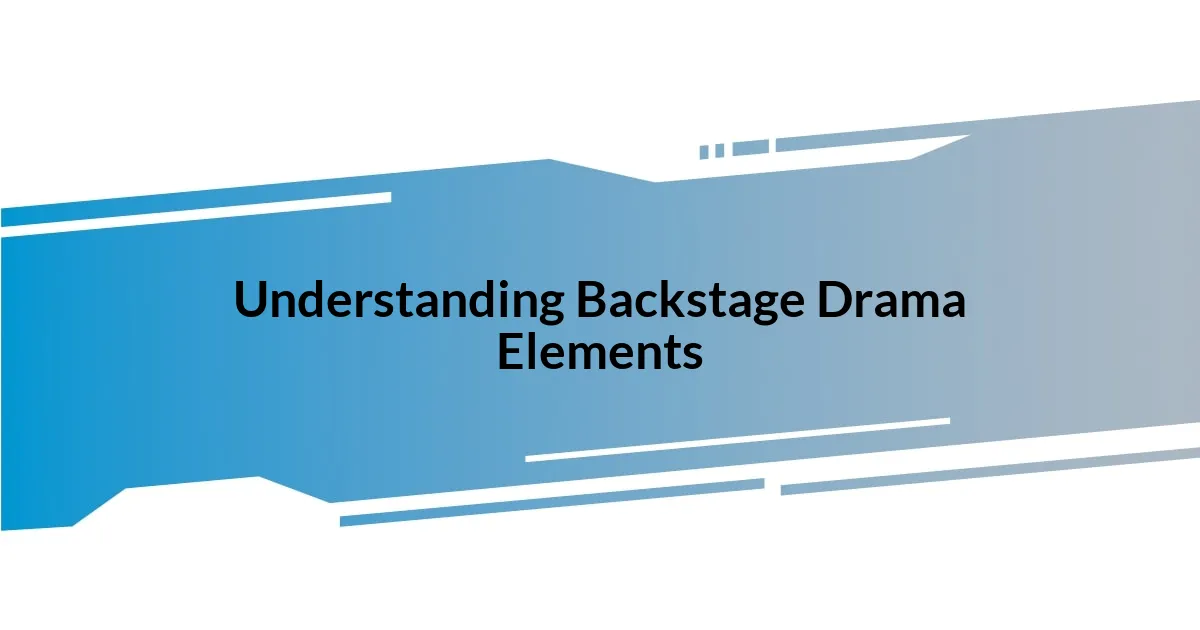
Understanding Backstage Drama Elements
When I think about backstage drama elements, I often remember the palpable tension of opening night. The air is thick with excitement and nerves, creating a unique atmosphere that’s hard to describe. Have you ever felt a rush of adrenaline just waiting in the wings, knowing that the show ahead could either be a triumph or a total disaster?
Another important element is the camaraderie among cast and crew. During my time in theater, I’ve shared countless moments of laughter and frustration with my fellow performers, which often turned our adrenaline-fueled chaos into a bonding experience. It’s this shared vulnerability that transforms competitors into allies, reminding us of the beauty in collective storytelling.
And let’s not forget the unexpected surprises that can emerge during a performance. I once experienced a scene where a prop went missing just moments before my cue, leaving me to improvise on the spot. This taught me that flexibility and quick thinking are crucial backstage elements, shaping the narrative as much as any scripted dialogue would. How do you handle unexpected changes? I’ve learned that they often lead to some of the most memorable moments in a show.
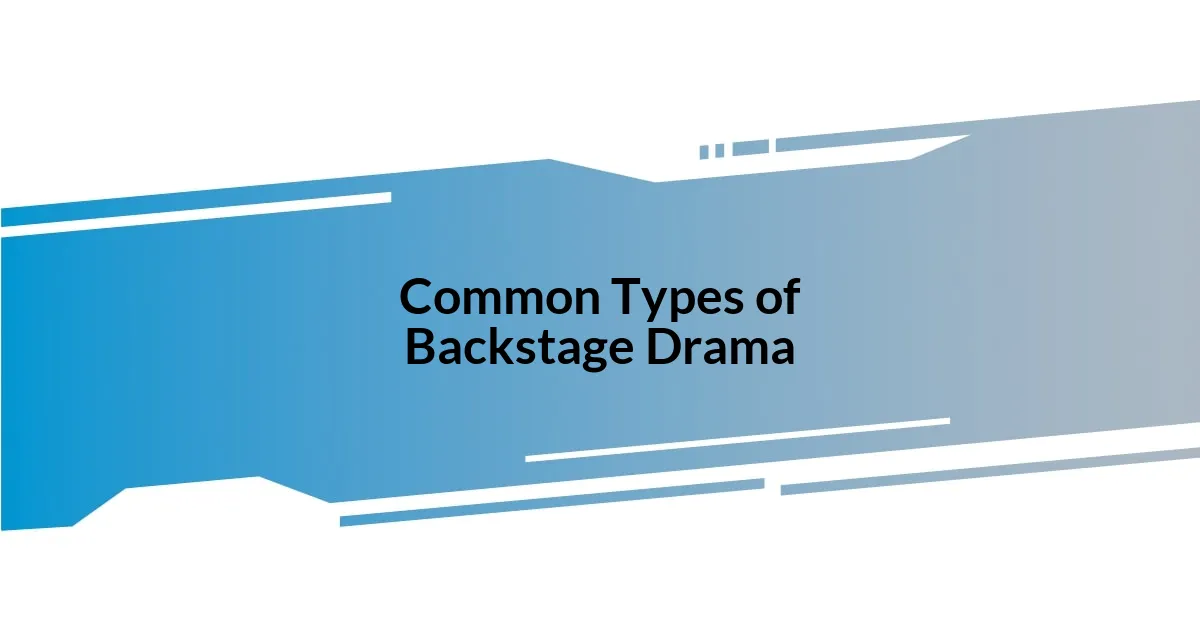
Common Types of Backstage Drama
Backstage drama often manifests in a variety of ways, each with its own unique flavor. I’ve witnessed everything from rivalries between cast members to heartwarming reconciliations in the midst of chaos. There’s something intriguing about the mix of emotions that transpire just beyond the curtain, where everyone’s nerves and excitement collide.
Here are some common types of backstage drama I’ve encountered:
– Tension between Cast Members: Competitive spirits can sometimes ignite conflicts or even alliances.
– Last-Minute Changes: Shifting roles or lines due to unforeseen circumstances can lead to chaos or camaraderie.
– Prop Disappearances: I once had a scene where a vital prop went missing, leading to a frantic search that turned into a hilarious bonding moment among us.
– Emotional Breakdowns: Stress can become overwhelming, resulting in emotional outbursts that remind us of our shared human experience.
– Unplanned Pacifiers: When the pressure builds too high, it’s often the small jokes or anecdotes shared backstage that lighten the mood just in time.
Each type adds its own spice to the undercurrent of a production, reminding me that the story doesn’t just unfold on stage but behind it as well.
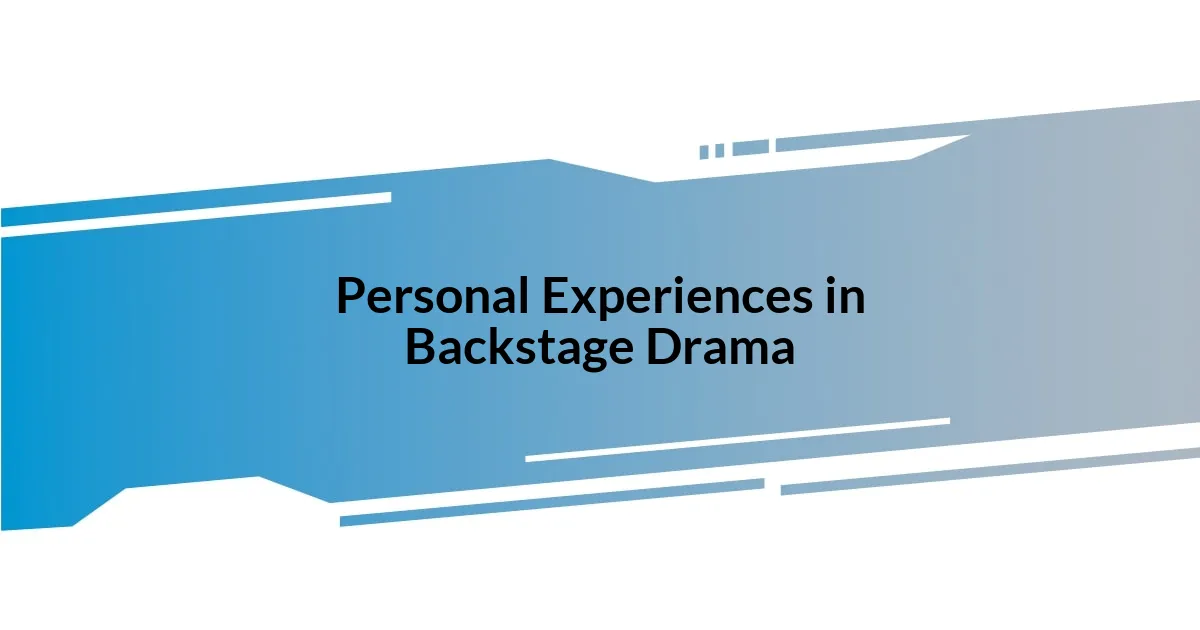
Personal Experiences in Backstage Drama
Backstage, I’ve encountered some unforgettable experiences that shaped my perspective on drama. One time, I remember feeling completely frazzled when the stage manager had to call for a last-minute rehearsal just hours before our show. The tension was palpable, yet amidst the chaos, we found humor in our plight, sharing laughs that lightened the mood and brought us closer together. It reminded me how essential a supportive environment is, especially when the pressure is on.
I’ve also had a moment where the unexpected mingled with the scripted to create something magical. In a musical number, one of my fellow dancers tripped, and instead of letting the moment derail us, we all adapted seamlessly. It was moments like this that taught me the beauty of spontaneity. Have you experienced something similar? I’ve realized that those unplanned, magical moments often become the highlights of our performances, turning small mishaps into shared triumphs.
Reflecting on emotional experiences, I recall a time when I battled through my nerves before going on stage. I had just lost a beloved family member, and the show felt like an escape. Standing there in the wings, I channeled my grief into my character, and though I was vulnerable, the catharsis I felt was profound. These emotional connections remind me that backstage drama isn’t just about the theatrics; it’s about forging genuine bonds and understanding our shared humanity.
| Experience Type | Personal Insights |
|---|---|
| Last-Minute Rehearsal | Supportive atmosphere turned chaos into camaraderie. |
| Unexpected Trip | Spontaneity transformed a mishap into a memorable performance. |
| Channeling Grief | Emotion turned vulnerability into a powerful performance. |
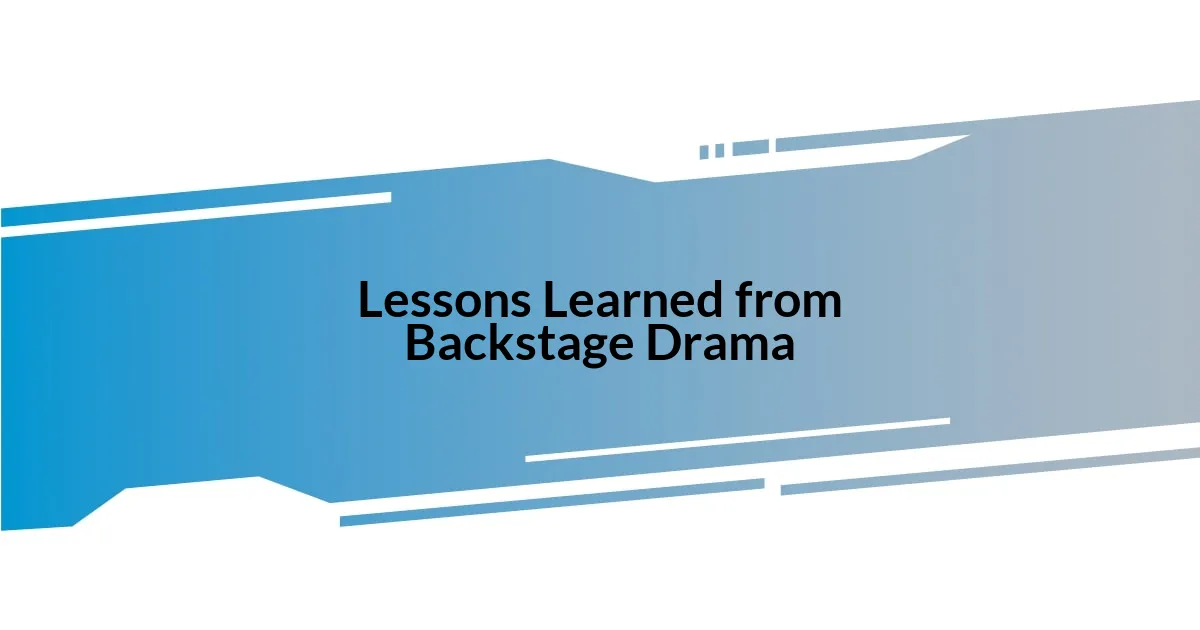
Lessons Learned from Backstage Drama
Navigating through backstage drama has taught me the importance of adaptability. I once encountered a situation where an entire scene had to be re-blocked just minutes before the show. It was stressful, yet it forced me to think on my feet and collaborate with my castmates. This experience reinforced that flexibility isn’t just a skill; it’s a survival tactic in the unpredictable world of theater.
I often reflect on how backstage conflicts, while challenging, can lead to unexpected growth. During a rehearsal, I experienced a disagreement over the interpretation of a scene. Instead of letting it fester, we chose to have an open discussion about our perspectives. It was remarkable to see how an honest conversation transformed tension into mutual understanding. Have you ever turned conflict into a collaboration? Those moments remind me that communication truly is the key to any successful production.
Lastly, I’ve learned that even in the most chaotic moments, humor can be a powerful ally. I remember a particularly hectic show when a cast member interrupted a serious scene with a well-timed joke, breaking the tension for everyone. Laughter not only lightened the mood but strengthened our camaraderie too. In those high-pressure situations, it’s often the little things that create the most significant impact and remind us why we love performing in the first place.
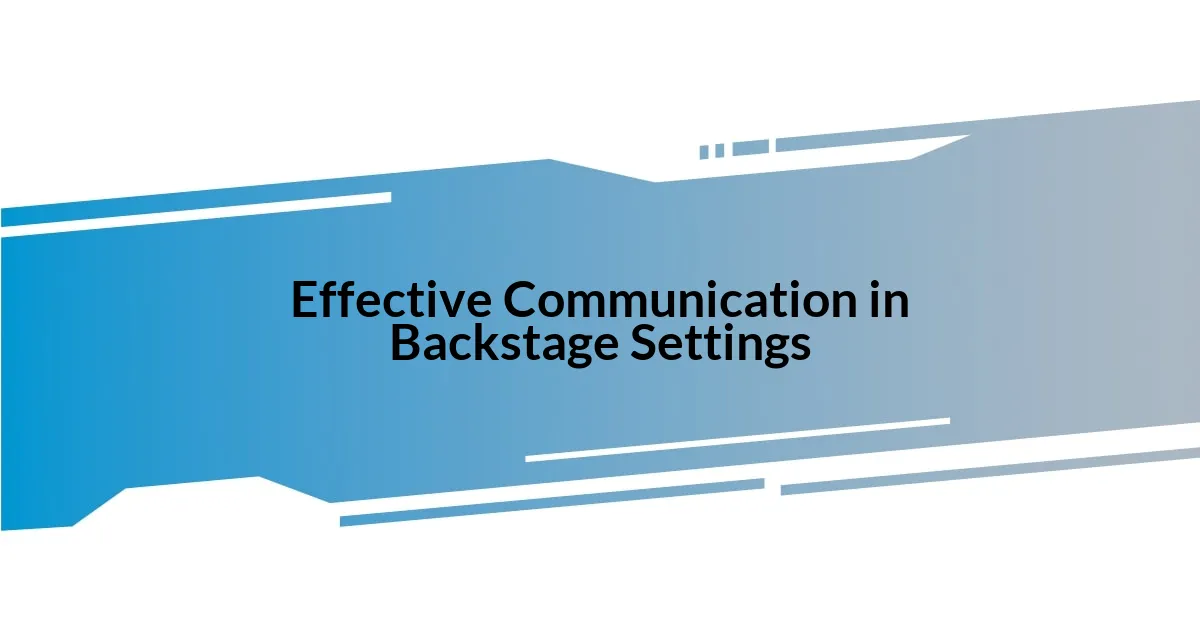
Effective Communication in Backstage Settings
Effective communication backstage is crucial for maintaining a smooth production flow. I remember a rehearsal when our lighting designer accidentally left the stage dimmed while we were in the middle of a scene. Panic spread through the cast, but instead of letting confusion reign, we relied on clear signals and established cues to navigate the chaos. I found that when we communicated openly about our needs and concerns, it transformed a potentially disastrous moment into a shared experience that brought us closer together.
During one performance, a fellow actor missed his cue, resulting in a ripple effect of confusion. Instead of panicking, I quickly whispered the new line to him, and I could sense the relief wash over his face. This moment drove home a valuable lesson: the more we trust one another and speak up, the easier it is to adapt in high-pressure situations. It made me wonder—how can we cultivate an environment where everyone feels comfortable communicating their thoughts without fear of judgment?
I’ve also learned that body language plays a significant role backstage. I recall when I was intensely focused on my part, and a quick thumbs-up from the stage manager reminded me to breathe and stay grounded. It’s incredible how non-verbal cues can convey essential messages and maintain a sense of calm. Effective communication isn’t just about words; it’s also about creating an atmosphere where everyone feels seen and heard, especially in those moments when the stakes are high.
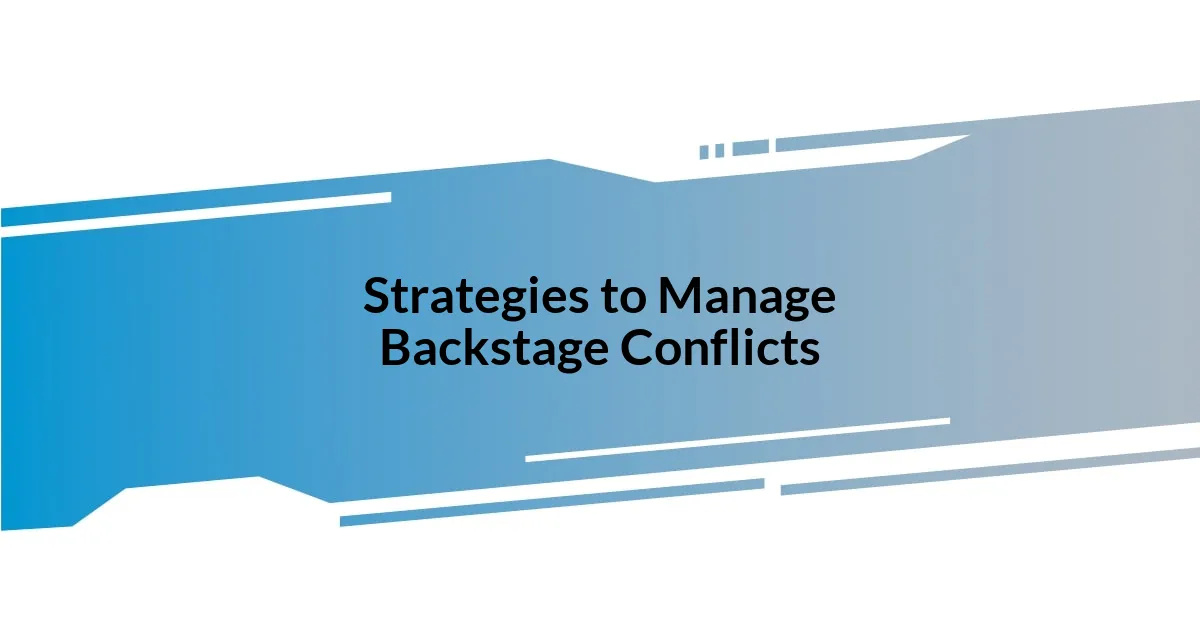
Strategies to Manage Backstage Conflicts
Managing backstage conflicts is a delicate dance, but I’ve found that one of the most effective strategies is to foster empathy among team members. I vividly remember a time when two cast members had a heated disagreement over a scene choice. Rather than taking sides, I suggested we all sit down and share how we felt about it. This collective expression not only diffused the tension but also deepened our understanding of each other’s artistic intentions. Does it seem impractical to you? I assure you, taking a moment to listen can turn a storm into a gentle breeze.
Another approach I’ve adopted is the practice of setting clear boundaries and responsibilities. There was an instance where overlapping duties led to confusion and frustration. To tackle it, we created a simple schedule that outlined everyone’s roles, from the actors to the crew. It’s amazing how clarity can prevent misunderstandings before they escalate. I often ask myself, “What could we have done differently?” Having clear guidelines helps to ensure that everyone knows their responsibilities, paving the way for a smoother production.
Lastly, never underestimate the importance of humor in easing conflict. I recall a particularly intense rehearsal where tempers flared over a miscommunication. In a moment of spontaneity, I cracked a joke that lightened the mood and made everyone burst into laughter. It was a reminder that sometimes, to diffuse the heat of the moment, a little humor goes a long way. Have you ever noticed how laughter can shift the energy in a room? Bringing joy into tense situations can transform conflict into connection, making our theatrical journey more enjoyable together.
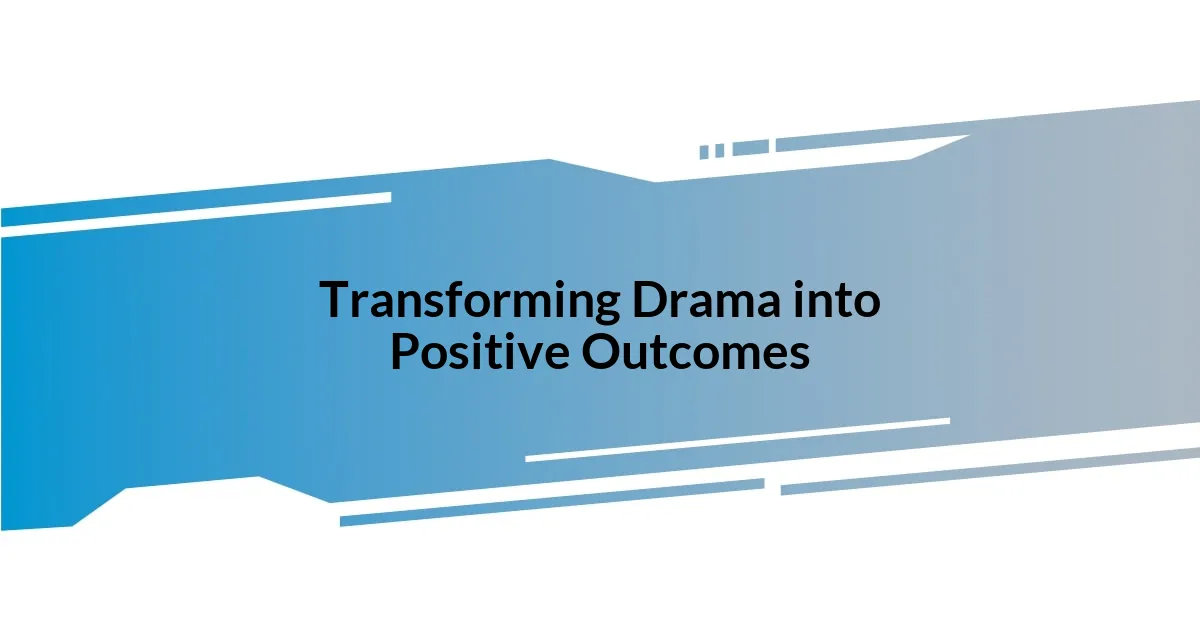
Transforming Drama into Positive Outcomes
Transforming drama into positive outcomes often requires a shift in perspective. I recall a time when a last-minute script change caused an uproar among the cast, igniting frustration and anxiety. Instead of dwelling on the sudden shift, I encouraged us to view it as a chance to showcase our adaptability. It was exhilarating to see everyone rise to the occasion, infusing the performance with energy that turned uncertainty into a dynamic presentation. Isn’t it fascinating how embracing change can sometimes unlock new levels of creativity?
I’ve also discovered the power of reflection in navigating backstage drama. After a particularly chaotic performance where everything seemed to go wrong, we gathered for a post-show talk. Rather than pointing fingers, we explored what worked and what didn’t. Sharing our feelings and insights not only helped us understand each other better but also laid the groundwork for growth. It amazed me how a simple discussion transformed our feelings of defeat into a collective determination to improve. Have you ever experienced a moment of reflection that turned a setback into motivation?
Another key element in turning drama into positive outcomes is celebrating small victories. I remember when we successfully managed a complex scene that had initially caused stress and miscommunication. Afterward, we took a moment to acknowledge each other’s efforts with a round of high-fives and cheers. That simple gesture filled the atmosphere with positivity and reminded us all why we love working together. It makes me think—how often do we pause to recognize our achievements, no matter how small? Acknowledgment can truly be a powerful tool for fostering a supportive environment.